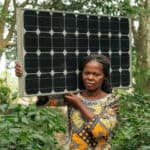Hidden Opportunity: How Investors Can Unlock the Potential of Refugee Entrepreneurs
Adenah Bayoh was only nine years old when she fled her home in Liberia to escape violence. After resettling in New Jersey and earning a bachelor’s degree in business management, she sought to become an IHOP franchisee. It took some persistence and a lot of patience: Seven banks turned down her loan application before she was successful. But today, Bayoh owns three IHOPs, has launched a chain restaurant of her own, and has built a real estate company with a portfolio of over $200 million in assets. She is the second largest employer in her town of over 54,000 people.
Other refugees like Adenah Bayoh share her tenacity, entrepreneurial talents and success, yet we rarely hear their stories. Too often, we overlook the hope and potential refugees possess and instead subscribe to the popular narrative that surrounds them — as a burden to society that only charity can address.
Globally, almost 70 million people were displaced as of 2017 – forced to leave their homes due to armed conflict, violence, human rights violations and climate change. With this number set to grow, some estimates say precipitously, it’s clear that forced migration is one of the defining social crises of our time.
In response, we are building the Refugee Investment Network (RIN) to assist and encourage investors to direct private capital toward refugees and the communities hosting them. The RIN’s recently released report, “Paradigm Shift: How investment can unlock the potential of refugees” illustrates the massive and urgent need for private capital to help mitigate the refugee crisis. Perhaps more importantly, however, it highlights a growing, sustainable opportunity for investors to engage. Indeed, a new movement toward “refugee investing” is emerging, and it represents an exciting field of impact investing – for investors, refugees and the communities they live in alike. The report presents more than a comprehensive assessment; it also puts forth concrete ways to produce both financial and social returns.
“Paradigm Shift” brings to light new and often counter-intuitive data from refugee investors like Kiva, a global crowdfunding platform that offers lending to underserved individuals, that belie conventional views of refugees as high-risk debtors. With over $9 million in loans to more than 8,000 forcibly displaced entrepreneurs over the past year and a half, Kiva is seeing average repayment rates of 96.6 percent among refugee entrepreneurs – on par with the 96.8 percent among host-country entrepreneurs.
The report shows that when presented with access to labor markets, refugees often invest in their host communities, introduce innovative ideas, and offer a net gain to the local economy. In other words, stories like Adenah Bayoh’s would likely be more common if refugees could see easier pathways to capital and investments.
So, what is a refugee investment? Informed by discussions with over 100 investors, humanitarians, development finance professionals, entrepreneurs and forcibly displaced people, the RIN created the Refugee Lens to help address this question. The Refugee Lens is a framework that investors can use to qualify and track investments, both historical and prospective, and to clarify which ones can be considered refugee investments.
The lens considers enterprise ownership and management, as well as an organization’s potential for catalytic change within the broadly defined “refugee community” in order to define the various types of investments. Under this framework, an investment must be owned or led by refugees to be designated as a refugee investment. The Refugee Lens further defines “refugee-supporting” activities, or activities that positively affect the lives and well-being of refugees or their host communities through direct products and services, workforce development, or by improving humanitarian response capacity.
When applying the lens, it is clear that many refugee investments have already taken or are currently taking place, despite the multiple barriers that stand in their way—from investors not knowing how to find strong refugee entrepreneurs, to policies restricting refugees’ ability to work or own a business. For example, in 2007, the Small Enterprise Assistance Fund (SEAF) took a chance on Bosnian refugee Goran Kovacevic, who at that time was operating 16 grocery stores with 306 employees. Boosted by the support of SEAF’s investment, Kovacevic’s grocery store chain, Gomex, now has 159 stores with nearly 1,000 employees throughout Serbia and is earning annual revenues of over $100 million.
Just like Adenah Bayoh, Kovacevic’s story represents the potential that investors can unlock by investing in a refugee’s business.
If knowing where to go from here seems daunting, don’t worry. A review of “Paradigm Shift” will show you several specific ways that investors can get involved – from applying the Refugee Lens to their existing portfolios, to supporting ecosystem builders that are already taking the lead in assisting refugee entrepreneurs.
With millions of displaced people worldwide, supporting those affected by global forced migration is not an easy task: We need all hands—or capital—on deck. This means that humanitarian organizations cannot remain the only actors in this space. While humanitarians’ expertise and on-the-ground experience is invaluable, impact investors, foundations and corporations, and faith-based and institutional investors must also play key roles in addressing global forced migration. We are confident that together, we can change the narrative and unlock the immense potential of refugees and the communities hosting them.
Readers can learn more about the Refugee Investment Network (RIN) at www.refugeeinvestments.org or follow the RIN on Twitter at @RefugeeInvest.
John W. Kluge is founder and managing director, and Timothy W. Docking is Managing Director, of Refugee Investment Network
Photo: A refugee-run small business. Credit: UN Women, via Flickr.
- Categories
- Investing, Social Enterprise



